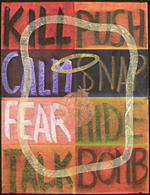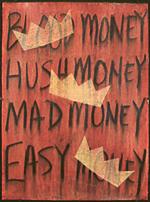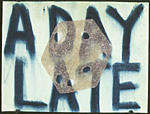February 2000 field recordings by Scout Finch |
|||||||||||||||||||||||||||||||||
|
"Art has a tendency to take the form of what you're willing to do." Steve Briscoe is a painter/musician living in Oakland, California. He and his wife, artist Lynn Beldner, bought their own home in mid-1998, one that, as a crack house, had been the scourge of the neighborhood for many years. Most area residents applauded the arrival of their new neighbors, although every now and then some lost soul will come straggling up the porch steps, hoping to score--only to be confused by the freshly mown lawn and barking dog in the front window. I recently sat down with Steve and my tape recorder, and we watched the clouds, waited for the rain to fall, and talked for about an hour. We talked about his day job, about the art that he makes, and about Charm House, the pop band he fronts.
You have two careers going on simultaneously: painter and singer. Do you want to talk more about the band or the visual art? Steve Briscoe: Whatever makes sense to you and your readers. Well then, let's talk about the art world. As I read your bio, I noticed that you'll be turning 40 this year. SB: Thanks, thanks for putting that in the record. Yeah. It's true. I only mention it because I'm kind of looking forward to 40. I often feel like my 20s are kind of blah, like something exciting is supposed to happen, but mostly I'm just sort of waiting for life to settle down and begin. SB: I'm not sure that ever changes, though. You know, in a way, I'm working at the same job I had when I was in college. It's more advanced than what I was doing then You're working at the Oakland (California) Museum, doing installations? SB: Yeah. Yeah, I'm getting into other aspects of that. I'm doing more cabinetry building and mount-making and project management, things like that. Do you freelance with different museums, or are you just at the Oakland Museum? SB: I do freelance some, but Oakland is my main museum. Can you explain a little bit about what cabinetry making is? SB: Well, in any kind of interactive exhibit where you might have a video monitor, or a computer screen--that's what I'm working on now--it needs to be put in a box so that people won't mess with it. I'm doing this walnut-trimmed box with Formica. It's stuff I haven't really done that much of, so I'm always learning new things. That's what nice about that kind of a job. It's interesting to think that somebody makes those. That's the kind of thing that I think people assume is just there. But here it is: you're the guy that makes that stuff. SB: Well, a lot of times we farm it out to some cabinet shop or something. Other times we just make it in house. Do the museums reuse cabinetry? Or do they just use it once and disassemble it? SB: The thing I'm [currently] making is for the permanent display. So it's more of a [long-term] project. A lot of times, if we make something for a temporary exhibit, we'd just, you know, just take something and paint it, most of the time. Make it out of particle board
Do you use a lot of tiger-striped design when you paint them? I think that's a really underused motif. You know, tiger stripes, leopard spots, the whole jungle cat look. SB: You'll have to start your own museum. Are you working full time now? SB: It's going to be almost full time this year. It depends on the show schedules, how much work there is. But there's a big show coming up, a travelling show, coming into Southern California first, then up here. I'm going to work on that, and it'll probably take most of the year. What about your own art? What's next? SB: No shows in the works right now. I just had the one at Traywick (Berkeley, CA) Gallery in the fall. Generally she (owner/director Katrina Traywick) keeps my work up in the back galleries, so it's always visible in a way. There's kind of vague plans for this and that. At the moment I'm going to wait until something comes along. I haven't really been working on [organizing a new show]. Is it like setting up shows for the band, where you sort of call around and say, hey? SB: Actually, it's not too much different. Although the lead time is longer. You need to have the work available for them to see 6 months in advance. And then they kind of look at it and say, "Well, in 6 months, you'll be ready ‘cause you'llhave worked for six months." (laughs) Do they want you to have a certain number of pieces to display? SB: Well, there's a certain amount of real estate you have to take up at a gallery. So it depends on the space of the gallery. And, they like [you to have] enough to pick from. That sort of thing. When I first e-mailed you to ask if we could do this interview, you joked, "Is it okay if I engage in shameless self-promotion?" And I thought, "that's a great idea," but I'd never really considered it. You know, I didn't really envision interviewing somebody who had, for lack of a better way to put it, a product to push. You know what I mean? SB: Yeah, but well, everybody's got a product. Do you notice the difference between artistic endeavor and business endeavor - does that affect you? SB: Yeah, they're definitely the kind of things that affect each other in ways that they shouldn't, in the perfect world. But it's pretty hard not to I mean, it's still a [process] where you're producing something that's an artistic effort and then trying to get people to look at it, and that takes marketing, and that takesexposure. And those things don't just come for nothing, or by accident. You've got to put it out there and say "look at this!" Do you find yourself changing what you do with your art? Do you ever paint something and go, "Oh, everybody's going to hate this, I'd better change it"? SB: Certainly, art is a business, and you know, the more things that happen around it, the better, the more reviews the better. But no, I think you know, when you've finished a painting, whether you're still going to own it after the show. You can't worry about it. Oddly, it's a fatalistic sort of endeavor. The music is the same way -- it's like, my music is very pop-ish, it's not anything adventurous or like John Cage or anything. You know? But at the same time, as much as I strive for nice simple pop songs, they don't usually sound that way, they don't come out as easy listening. You know what I mean? Yeah. SB: They kind of, I don't know, there's something that's kind of odd about them. The same thing applies to the paintings -- even if you wanted to make "nice" things, your failure to do that is what keeps it from becoming [boring]. In art or in music, you're always trying to live up to your role models. The things that you've looked at are the things that you internalize and you regurgitate on the canvas, or you try to re-write the perfect pop song. Andthe failure is what makes it your own. And if you can kind of embrace that, then your marketing is just, "Well, this is the stuff I make." And, you know, "It's supposed to be fucked up." In comparing music and art, you made a comment about owning the painting after the show, after the run, but with doing a painting as opposed to writing a song - SB: Very different. Yeah! Because you actually give up ownership of the piece. If somebody buys the painting, it's gone. You might take a picture of it or somethingbut with a song, you can put a record out, anybody can own it, but you can still sit down with the guitar and play the song. SB: Right. Music is more like printmaking, where you make limited editions of [your work]. I was thinking about that this morning. I was thinking that making up songs with a band is sort of like coming into a studio with a bunch of artists, and I've got a big shape on a piece of paper, and they've all got their crayons out, and I just throw the big piece of paper in there. And then we all attack it with our crayons and finish it. You know? It never sounds the same as when you [started it]. You don't have complete control when you're working on songs with a band. So you feel like working with a band involves, in some way, giving up the ownership of the work before it ever becomes public? SB: Yeah. You have the idea, but they flesh out the parts. Unless you really are going to keep control of all that - then you have to pay them. And I don't want to do that! So, you know, it's a different kind of process altogether.
in the junk drawer:
|
|


















